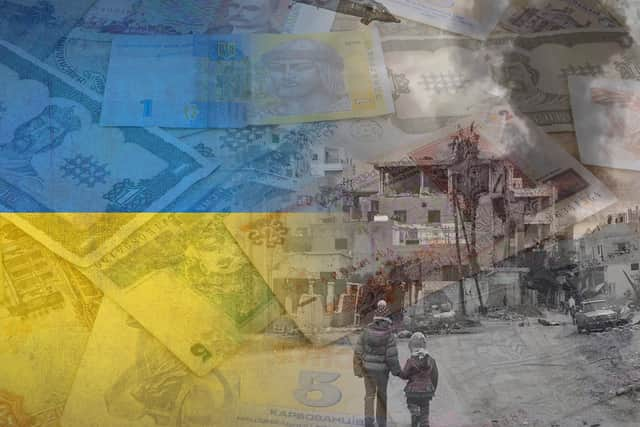Ukraine economy: what impact is Russian invasion having, cost of war and 2022 financial forecasts
and live on Freeview channel 276
Ukraine’s economy is expected to shrink by almost half this year as a result of the Russian war, the World Bank has said.
The institution forecasts Russia’s invasion will also cause great economic damage across eastern Europe and parts of Asia, meanwhile Russia’s own economy has already plunged into a deep recession.
Advertisement
Hide AdAdvertisement
Hide AdAnna Bjerde, World Bank’s vice president, said Ukraine needs “massive financial support immediately” to keep the country’s economy going.
What impact is the Russian invasion having on Ukraine’s economy?
Ukraine’s economy is expected to shrink by an estimated 45.1% this year, but this figure could change depending on the duration and intensity of the war which has already surged inflation, debt, and poverty levels.


The conflict in Ukraine has shut half of the country’s businesses and slashed exports, the World Bank said.
It said the war had made economic activity impossible in large parts of the country - disrupting farming and harvest operations.
Advertisement
Hide AdAdvertisement
Hide AdThe closure of Black Sea shipping from Ukraine had cut off around 90% of the country’s grain exports and half of its total exports.
Ukraine is the world’s biggest exporter of sunflower oil and the shutdown of exports has affected global food prices.
The bank has sent almost $1 billion of assistance to Ukraine so far, promising a further $2 billion in the coming months.
Ms Bjerde said: "The Russian invasion is delivering a massive blow to Ukraine’s economy and it has inflicted enormous damage to infrastructure.”
What about Russia’s economy?
Advertisement
Hide AdAdvertisement
Hide AdWhile Ukraine’s economy will suffer the most damage by the war, the World Bank said Russia’s economy had already been plunged into a deep recession due to sanctions imposed by Western countries.
The sanctions have ranged from cutting ties with Russian banks to targeting Russian politicians and oligarchs, to banning luxury goods imports and flights.
The bank projected Russia’s economy would contract by 11.2% in 2022 as the sanctions take hold and effect.
America has banned all Russian oil and gas imports.
However, EU countries continue to pay Moscow up to £674 million for energy every day - amounting to an estimated 40% of the Kremlin’s income.
What other countries’ economies will be affected?
Advertisement
Hide AdAdvertisement
Hide AdThe war is also hitting the developing economies of Europe and Central Asia, a region already heading for an economic slowdown this year due to the ongoing effects of the pandemic.
The World Bank said that Belarus, the Kyrgyz Republic, Moldova and Tajikistan were also projected to fall into recession this year.
Growth projections had been downgraded in all economies because of the war, with weaker-than-expected growth in the euro area, the Bank said.
Russia and Ukraine account for about 40% of wheat imports in the region and about 75% or more in Central Asia and the South Caucasus.
Advertisement
Hide AdAdvertisement
Hide AdAsli Demirgüç-Kunt, World Bank chief economist for Europe and Central Asia, said: "The Ukraine war and the pandemic have once again shown that crises can cause widespread economic damage and set back years of per capita income and development gains.
“Governments in the region should fortify their macroeconomic buffers and credibility of their policies to contain risks and deal with potential fragmentation of trade and investment channels; strengthen their social safety nets to protect the most vulnerable, including the refugees; and not lose focus on improving energy efficiency to ensure a sustainable future.”
Comment Guidelines
National World encourages reader discussion on our stories. User feedback, insights and back-and-forth exchanges add a rich layer of context to reporting. Please review our Community Guidelines before commenting.
